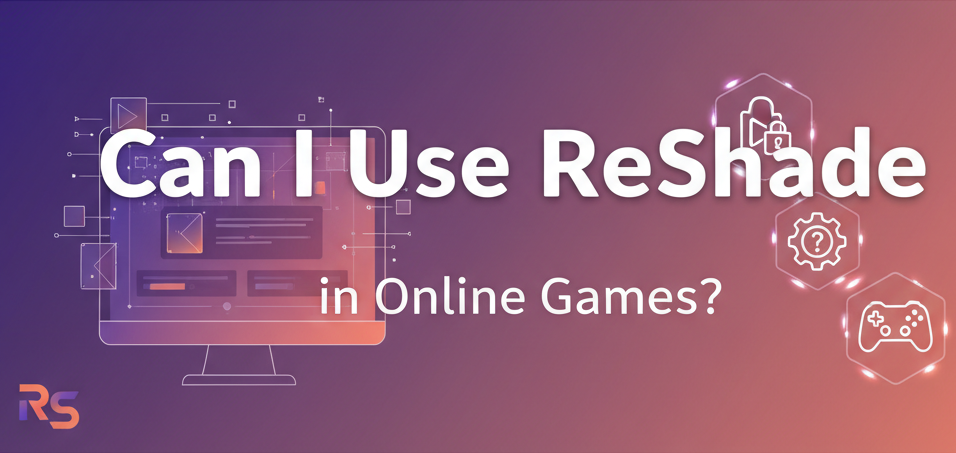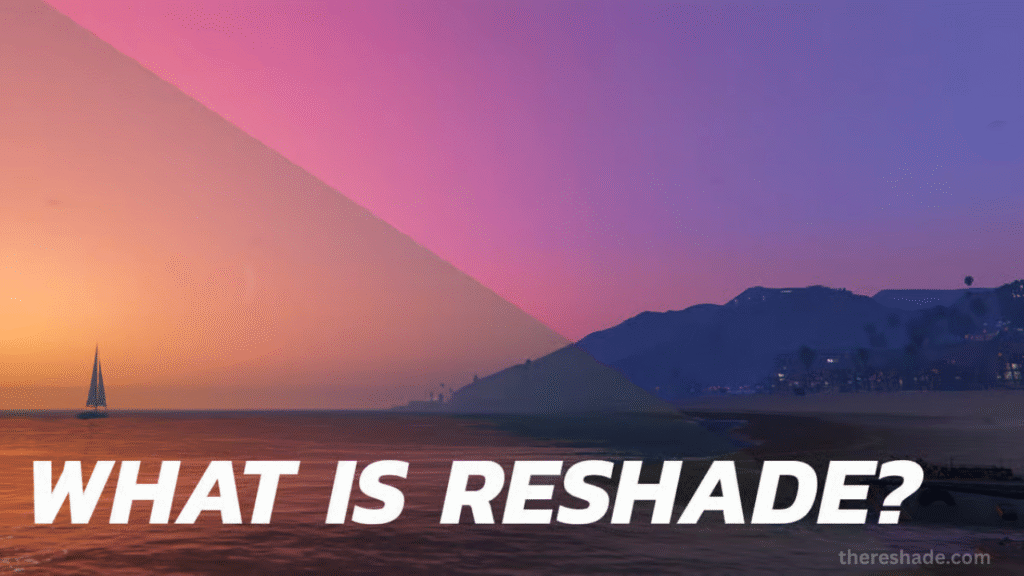ReShade has become one of the most popular post-processing tools for gamers who want to enhance their visuals beyond what the game’s native settings allow. With features like advanced color correction, sharpening filters, bloom, depth-of-field effects, and even ray tracing-like shaders, it’s no surprise that players ask the question: “Can I use ReShade in online games?”
This guide will give you a complete breakdown of ReShade’s compatibility with online games, the risks involved, pros and cons, and best practices to ensure safe use. Whether you’re playing competitive titles like CS:GO, Valorant, or Warzone or MMORPGs like World of Warcraft, you’ll find out what you need to know before installing.
What Is ReShade?
ReShade is a post-processing injector developed by crosire. It hooks into a game’s graphics pipeline and applies additional effects after the frame has been rendered by the GPU. This means it doesn’t modify game files directly; instead, it adds an extra “layer” of visual processing.
Some of its most used features include:
- Color grading and tone mapping
- SMAA/FXAA anti-aliasing
- Ambient occlusion effects
- Sharpening filters
- HDR and bloom effects
- Depth-of-field and motion blur
- Experimental ray tracing shaders
While all these effects improve immersion in single-player games, using ReShade in multiplayer or online games is a bit more complicated.
Can You Use ReShade in Online Games?
The short answer: It depends on the game and its anti-cheat system.
- Many online games consider ReShade a “third-party injector”, which can be flagged by anti-cheat software.
- Some games allow it for cosmetic purposes (especially MMOs and RPGs), while others block it completely.
- Competitive shooters often ban ReShade because certain shaders can give unfair advantages, such as:
- Color correction to spot enemies more easily
- Depth buffer access for wallhacks or ESP-like effects
Therefore, before using ReShade in an online game, you must check the official policies of the developer.
How Anti-Cheat Systems React to ReShade
ReShade modifies how frames are processed, so anti-cheat engines may treat it as suspicious software. Here’s how popular anti-cheats usually respond:
- Easy Anti-Cheat (EAC) → Blocks games from launching if ReShade is detected.
- BattlEye → Often prevents ReShade from injecting into the game.
- Riot Vanguard (Valorant) → Strictly blocks all injectors, including ReShade.
- VAC (Valve Anti-Cheat in CS:GO/Dota 2) → May allow the game to launch but could ban accounts if shaders give competitive advantages.
- Blizzard Warden (WoW, Overwatch) → Restricts or prevents third-party post-processing tools.
In short: ReShade is usually not allowed in games with competitive anti-cheats.
Popular Games and ReShade Compatibility
Let’s look at some major online games and whether ReShade is typically safe:
| Game Title | ReShade Allowed? | Notes |
|---|---|---|
| CS:GO | ❌ Risky | VAC bans possible, especially with depth buffer effects |
| Valorant | ❌ Not allowed | Vanguard blocks ReShade |
| Fortnite | ❌ Not allowed | EAC blocks injectors |
| Apex Legends | ❌ Not allowed | EAC blocks ReShade |
| PUBG | ❌ Not allowed | BattlEye prevents it |
| World of Warcraft | ⚠️ Limited | Cosmetic shaders only, but still risky |
| Final Fantasy XIV | ⚠️ Limited | Many players use it, but technically unsupported |
| Elder Scrolls Online | ⚠️ Limited | Visual-only use tolerated |
| GTA Online | ❌ Risky | Rockstar bans for mods/injectors |
| Warframe | ⚠️ Limited | Sometimes works, but not officially allowed |
Tip: Even if a community says “I’ve been using ReShade for years with no problem,” that doesn’t guarantee safety. Developers can change policies anytime.
Risks of Using ReShade in Online Games
Using ReShade in online games comes with several risks:
1. Account Bans
Most competitive online games have strict no-modification policies. Even if ReShade doesn’t give you an unfair advantage, anti-cheat systems may still treat it as a violation, leading to temporary or permanent bans.
2. Performance Drops
Online games already demand stable performance for smooth gameplay. ReShade effects (like ray tracing or depth-of-field) can reduce FPS, causing lag in competitive matches.
3. Game Instability
ReShade hooks into DirectX/OpenGL/Vulkan APIs. Some games may crash, fail to launch, or show graphical glitches when used with ReShade.
4. False Security
Players sometimes believe “cosmetic-only” shaders are safe. However, anti-cheat doesn’t distinguish between cosmetic and exploitative shaders—it simply blocks injectors.
Pros of Using ReShade in Online Games
Despite the risks, some players still attempt it for the following reasons:
- Improved Visuals → Sharper textures, better lighting, and cinematic colors.
- Customization → Players can adjust graphics beyond in-game settings.
- Immersion → Especially in RPGs and MMOs, ReShade can make worlds more vibrant and atmospheric.
- Accessibility → Some shaders improve visibility for colorblind players.
Cons of Using ReShade in Online Games
On the other hand, drawbacks can outweigh the benefits:
- Ban Risk → Losing access to your account is not worth better visuals.
- Lower FPS → Competitive gaming values performance over graphics.
- Unstable Behavior → Crashes and compatibility issues.
- Not Officially Supported → Developers usually won’t help if ReShade causes problems.
Best Practices for Using ReShade Safely
If you still want to experiment with ReShade in online games, here are some best practices:
1. Check Official Policies
Always read your game’s Terms of Service or community guidelines. If the developer explicitly bans injectors, don’t risk it.
2. Avoid Depth-Based Shaders
Many anti-cheats flag ReShade when depth buffer access is enabled, as it can be exploited for cheats. Stick to color-only effects if the game allows it.
3. Use Whitelisted Versions
Some developers allow modified versions of ReShade that disable depth-buffer features. Look for official posts or community-supported versions.
4. Keep Single-Player vs. Multiplayer Separate
If you play both single-player and multiplayer games, use profiles to disable ReShade automatically when launching online games.
5. Test in Non-Competitive Titles
If you want to enjoy enhanced visuals, stick to online RPGs or co-op games where ReShade is tolerated instead of competitive shooters.
Alternatives to ReShade in Online Games
If your game doesn’t allow ReShade, consider safer alternatives:
- In-Game Filters → Some games (like CS:GO and Fortnite) provide colorblind or visual filter settings.
- NVIDIA Freestyle (GeForce Experience) → Allows post-processing effects in supported games with much lower ban risk.
- AMD Radeon Image Sharpening / FSR → For AMD users, adds sharpening and upscaling without injectors.
- Monitor Settings → Tweaking contrast, sharpness, and saturation can replicate some effects.
Conclusion
So, can you use ReShade in online games? Yes, technically—but with significant risks. While it can make games look stunning, most competitive titles block or ban its use because of potential exploits.
- If you’re playing single-player games or non-competitive online RPGs, ReShade can safely enhance visuals and immersion.
- If you’re playing competitive shooters or games with strict anti-cheat systems, it’s better to avoid ReShade and use built-in tools like NVIDIA Freestyle instead.
Final Advice: Unless you’re absolutely sure your game allows it, avoid using ReShade in online games to protect your account. Save it for single-player adventures, where you can enjoy all the visual upgrades risk-free.



